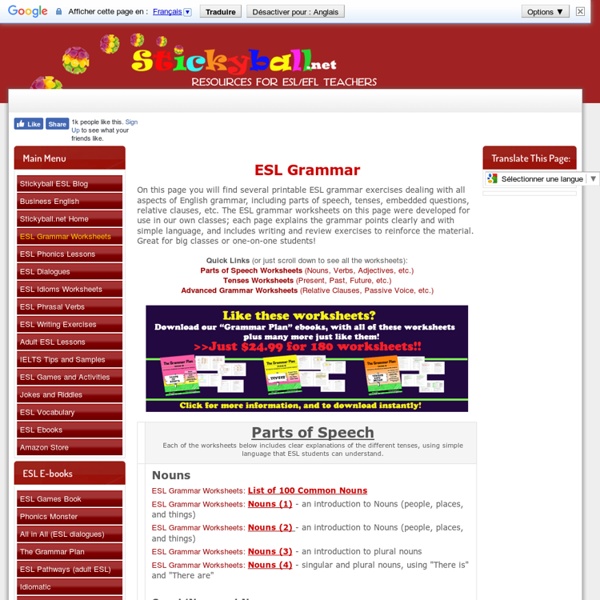ENGLISH PAGE - Past Perfect
The past perfect is a verb tense which is used to show that an action took place once or many times before another point in the past. Read on for detailed descriptions, examples, and present perfect exercises. Past Perfect Forms The past perfect is formed using had + past participle. Questions are indicated by inverting the subject and had. Negatives are made with not. Statement: You had studied English before you moved to New York. Complete List of Past Perfect Forms Past Perfect Uses USE 1 Completed Action Before Something in the Past The past perfect expresses the idea that something occurred before another action in the past. Examples: I had never seen such a beautiful beach before I went to Kauai. USE 2 Duration Before Something in the Past (Non-Continuous Verbs) With non-continuous verbs and some non-continuous uses of mixed verbs, we use the past perfect to show that something started in the past and continued up until another action in the past. Example: Past Perfect Exercises
Cours d'Anglais en ligne : to do or to make ? » Actualités » Enseigna
Comment apprendre l'Anglais ? Cours d'Anglais en ligne : to do or to make ? Cours d'Anglais en ligne : vocabulaire et grammaire Difference between make and do Casse-tête de la majorité des apprenants de langue maternelle française, quelles sont les différences principales entre "to do" and "to make" ? Même si la traduction approximative en français de ces 2 verbes est « faire », ceux-ci sont relativement différents : -« to do » est employé dans le cadre d'une activité temporaire, de la réalisation d'un petit travail -« to make » est plus créatif, il peut avoir un sens de produire ou de construire. Malheureusement beaucoup d'exceptions échappent à cette règle et doivent être apprises par cœur : so you do: the housework / some gardening / the washing up / your homework / your best / the shopping / the cooking / business with.....and so on so you make: « Do » and « make » nous servent également à former une pléthore de verbes à particules dits phrasal verbs : « Retour à la liste
What's the Time in English
Exercise Exercise on Telling the Time Explanation There are two common ways of telling the time. Formal but easier way Say the hours first and then the minutes. Example: 7:45 - seven forty-five For minutes 01 through 09, you can pronounce the '0' as oh. Example: 11:06 - eleven (oh) six More popular way Say the minutes first and then the hours. Example: 7.15 - fifteen minutes past seven Example: 7.45 - fifteen minutes to eight Another possibility of saying '15 minutes past' is: a quarter past Another possibility of saying '15 minutes to' is: a quarter to Another possibility of saying '30 minutes past' is: half past Example: 5:30 - half past five Watch Note Use o'clock only at the full hour. Example: 7:00 - seven o'clock (but 7:10 - ten past seven) In English ordinary speech, the twelve-hour clock is used.Timetables usually use the twenty-four-hour clock. Beispiel: 17:20 - twenty past five For times around midnight or midday you can use the expressions midnight or midday / noon instead of the number 12.
English Prepositions
Exercises on Prepositions Prepositions are short words (on, in, to) that usually stand in front of nouns (sometimes also in front of gerund verbs). Even advanced learners of English find prepositions difficult, as a 1:1 translation is usually not possible. One preposition in your native language might have several translations depending on the situation. There are hardly any rules as to when to use which preposition. The following table contains rules for some of the most frequently used prepositions in English: Prepositions – Time Prepositions – Place (Position and Direction) Other important Prepositions Exercises on Prepositions
Difference between DO and MAKE – 60 common English collocations – Espresso English
1000 Collocations e-book DO for actions; MAKE for creating Do you know the difference between DO and MAKE? These two words can be confusing, but I’ll teach you the difference – and teach you 60 common collocations with example sentences to help you! Basic Difference between DO and MAKE Use DO for actions, obligations, and repetitive tasks.Use MAKE for creating or producing something, and for actions you choose to do.DO generally refers to the action itself, and MAKE usually refers to the result. Common English Collocations with DO do the housework After I got home from the office, I was too tired to do the housework.do the laundry I really need to do the laundry – I don’t have any clean clothes left! EXCEPTION: make the bed = putting blankets, sheets, and pillows in the correct place so that the bed looks nice and not messy. do anything / something / everything / nothing Are you doing anything special for your birthday? Common English Collocations with MAKE
Sound Grammar 2-10 There is / There are
Conversation 1 Man: Excuse me, is there a gym in the hotel? Woman: Yes, there’s one on the first floor. Man: Great! And is there a pool? Conversation 2 Man: So, what is there to do in your town? Conversation 3 Man: What is there to eat? Conversation 4 Man: Are there exchange students are your school?



